Private healthcare in the UK is primarily used for what are known as ‘elective’ procedures and operations. These are procedures that are planned. If you are feeling seriously unwell or in an emergency, you should always use the NHS. Either your GP, out of hours services or call 999.
The way you use private healthcare in the UK will vary depending on:
- your individual needs, including:
– how urgent the procedure is
– your levels of pain and discomfort
– any potential complications - your overall health
- the condition (e.g. cataracts, knee or hip issues) you have,
- any cosmetic surgery you want,
- the healthcare provider you choose
- the type of treatment or procedure required.
These elements make up what is often known as your ‘patient journey’.
Here is an overview of what your patient journey might look like. However, different patients experience it differently, and you may have to go back a step or two, or even miss some out:
I (or a family member) have a health or cosmetic need
Seeking help
- For many people this means visiting your GP who may refer you to the private sector.
- You may have gone through the NHS initially and then decide to seek private health care due to waiting times or lack of provision to meet your need.
- Alternatively, you may decide to seek private healthcare directly, perhaps due to a desire for quicker access to treatment or specialised care.
- You may choose a private healthcare provider or consultant based on their availability, accessibility, location, price or patient ratings (something the PHIN website can help with) or based on your GP referral.
- If you have private healthcare insurance, you will need to contact them to check that any diagnostic appointments/ tests, proposed procedure is covered and that the private healthcare provider is covered by your insurer. They may ask for details of the consultant/ hospital and any tests/ procedures being planned. If you have been referred by your GP, make sure you ask your GP for this information.
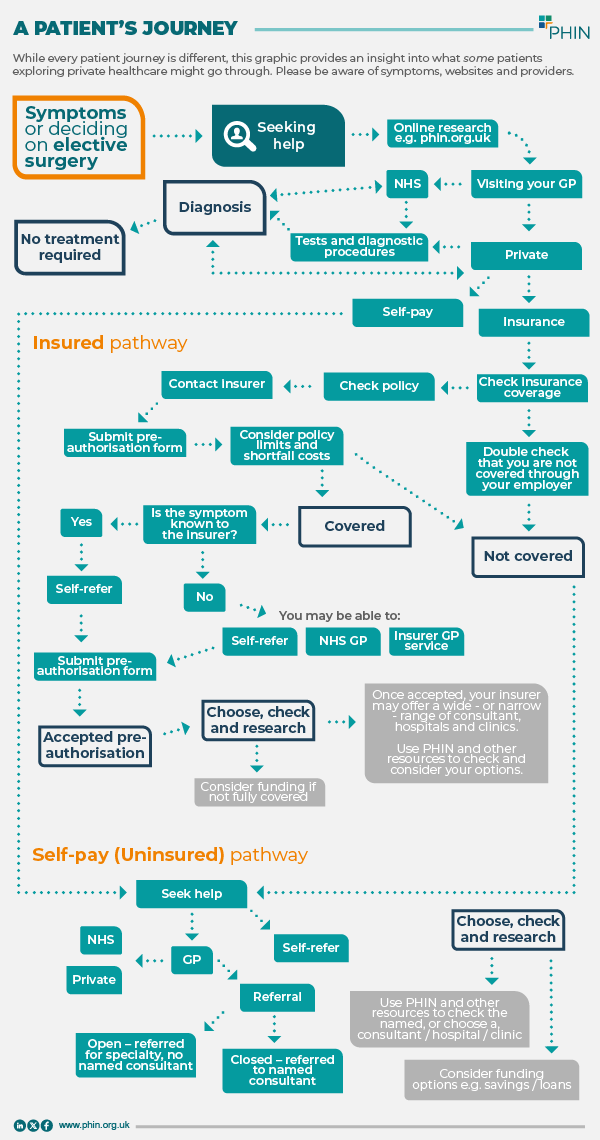
Initial consultation
- The first step is to make an appointment for a consultation. Your GP may write a letter for you to send direct or give to/show your provider.
- Alternatively you can make contact directly with the chosen private healthcare provider or consultant to schedule an initial appointment.
- You then meet the consultant or specialist for an initial evaluation, diagnosis, and discussion of treatment options. If you are planning cosmetic surgery, your consultant might also go through any additional risks or complications, as well as discussing your expectations.
- Your consultant may order tests, scans, or diagnostic procedures to support your diagnosis.
- If using insurance, you should keep your insurer updated with any diagnostic tests being proposed to ensure these are covered.
- You will need to pay for the initial consultation (either through insurance or self-pay).
What happens once I’ve been diagnosed?
Treatment Planning
- Based on the consultation and any required tests, your healthcare provider or consultant then develops a treatment plan and discusses it with you.
- They then agree on the course of action with you, which may include surgery, medical treatment, or other interventions.
Pre-Authorisation and Payment
- You will need to ensure your treatment is covered (pre-authorised) by private health insurance if you are planning to use that.
- If you are paying out of your own pocket (self-pay), then you may need to make payment arrangements in advance, this could include payment schedules or financing.
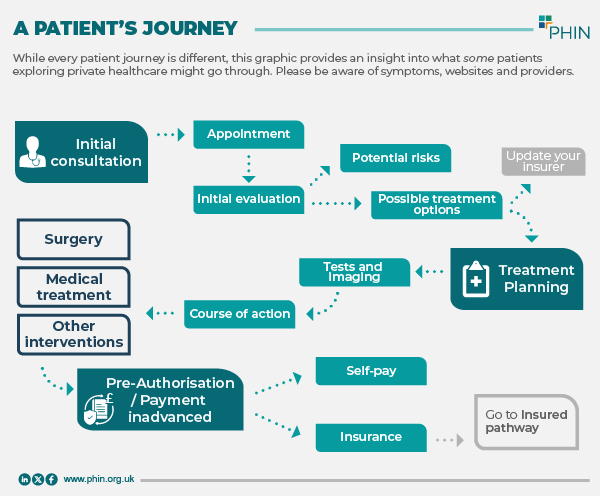
Scheduling the Procedure
- Once the treatment plan is confirmed and any necessary authorisations or payments are in place, your procedure or treatment is scheduled.
- You may also be called in to attend initial pre-screening tests before your procedure such as an ECG. or blood monitoring etc.
- If you are undergoing surgery, you will be given instructions on pre-operative preparations, such as fasting, dietary issues, medications, and transportation to the hospital or clinic and what to pack to bring with you.
- You will also be given general advice of the post operative/ post treatment procedure required and any aftercare or support you might need.
In hospital
The Procedure or Treatment
- The healthcare provider or consultant will explain the procedure or treatment to you.
- You undergo the scheduled procedure or treatment, in a private hospital or clinic or at a Private Patient Unit in an NHS hospital.
- Depending on your procedure and condition, you may be treated in one of the following ways:
– Outpatient: You are treated in a clinic and can go home immediately after your procedure.
– Day case: You are admitted to hospital, but not expected to stay overnight and will return home the same day.
– Inpatient: You are treated and stay in the hospital for at least one night.
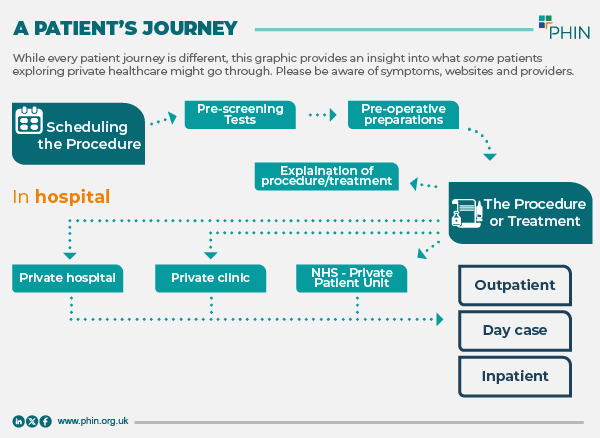
After I’ve been to hospital
Recovery and Aftercare
- After the procedure, you will be monitored in a recovery area.
- You may be discharged on the same day or, for more complex procedures, stay overnight.
- Your consultant provides guidance on post-operative care, such as physio, and follow-up appointments. You will be given a number/ contact to ring in case of any problems, emergencies or questions about your care.
- You will often need to continue to manage your health and well-being, which may include preventive care, lifestyle changes, and ongoing consultations with your consultant.
- In cases of complex or long-term conditions, you may require ongoing rehabilitation or specialised care.
Follow-Up Appointments
- You should attend any scheduled follow-up appointments to assess recovery and progress.
- These may be face to face or via remote online consultations.
- These appointments ensure that any issues or complications are addressed promptly.
Ongoing support
- You may need ongoing support, medication or services after you get home.
- Your consultant will normally provide written summary information that you can give your GP, including recommendations for further services. If these patient services are not covered by a package or directly paid for, you may arrange NHS support services yourself. You may need help, guidance and advice here.
Billing and Insurance Claims
- If you are using private medical insurance, your healthcare provider may submit its bills to your insurance provider or you may need to manage the paperwork or communicate with the insurer directly, depending on the policy.
- If you are self-paying, then you will need to manage the paperwork and ensure that your bills are paid on time.
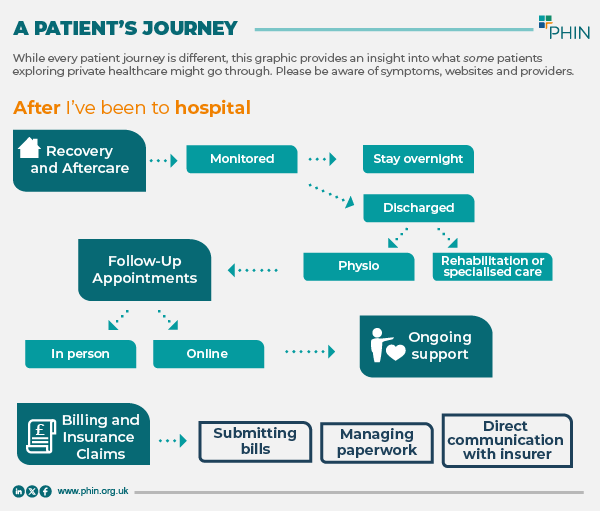
If you have a problem
Making a complaint
- Hopefully there won’t be any difficulties with your journey through private healthcare, and you will have the best outcome possible, but that won’t be the case for everyone.
- Both NHS and private healthcare providers follow the same Principles of Effective Complaints Handling and share the requirement to be as honest (known as the ‘Duty of Candour’) with you as you should be with them. They will give you open and transparent information about how they will try to reach agreement with you on your complaint.
- However, the way private/independent healthcare providers actually treat your complaint may differ from the way it is done in the NHS. These differences mainly arise because of the way doctors and other clinical professionals are contracted to work – like the difference between free market and publicly-funded industry.
- If you need to make a complaint, see our Complaints guide for more information.
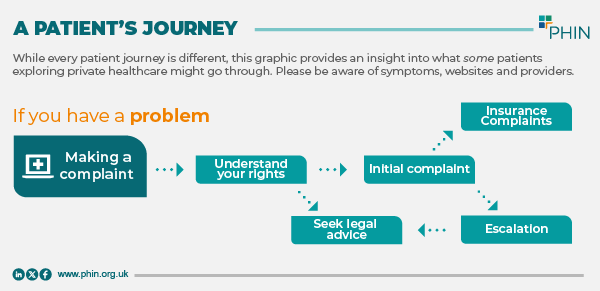
What costs can I expect to pay?
It's important to note that private healthcare in the UK can be costly, and access to certain treatments and specialists may vary. Private health insurance is often used to cover the expenses, but it's essential for patients to be aware of policy coverage, limitations, and any out-of-pocket expenses.
Potential costs that you or your private medical insurer could be charged during your journey can be split into three categories.
Pre-procedure:
- Outpatient consultation fees
- Tests, scans or diagnostic procedures
During your admission:
- Price of the procedure or treatment
- Anaesthetist fee (if they are required)
- Price of parking, newspapers and food while in hospital
On discharge home from hospital:
- Costs for overnight stay(s)
- Prescription charges for any medication on discharge from hospital
- Additional materials or home aids required for your recovery i.e. crutches, raised toilet seats
- Follow-up fees, including consultation, bandages/dressing changes/stitch removal
- Physiotherapy and rehabilitation services
Patients should always research and select reputable private healthcare providers and consultants to ensure high-quality care.
See our Help and Advice section for a range of more detailed guides on private healthcare.
Are we missing crucial information or significant steps in our patient journey infographic? Please, fill in this form and share your thoughts with us and help other patients make more informed decisions.
